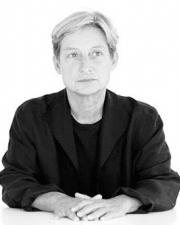You have /5 articles left.
Sign up for a free account or log in.
This is the tale of the professor who was told to teach a text by Judith Butler against his will.
Erik Ringmar, a senior lecturer in the political science department at Sweden’s Lund University, taught a course this fall titled Modern Society and Its Critics. The idea, he said, was to use only primary sources “to talk about people who are critics of modern society, modern society being the Enlightenment project, French Revolution liberalism, human rights, that kind of stuff. It’s about the way fascism emerges in European political thought.”
The previous year Ringmar taught a version of the class that included a theme on postmodernism. One of the readings for that theme was by Judith Butler, the feminist critic widely known for her work on the societal construction of gender.
This time around, Ringmar didn’t want to teach about postmodernism, or about Butler.
“I took away that theme because it really didn’t work with the other material and it was really very difficult for my students,” he said. “I removed that topic and, with that, this reading by Judith Butler. In Sweden, reading lists have to be approved by the department, so I had to go before this committee and they decided to put Judith Butler back on the reading list.”
Ringmar has written that the student representative on the committee complained about his "lack of focus on gender issues," and that others on the committee agreed. “They complained that there were no female authors on the reading list. I tried to explain to them: look, we’re talking Romantic and reactionary 19th-century thinkers here. There just weren’t a lot of women among them,” Ringmar said.
He did have a few women on the reading list. He’d reluctantly included readings by the anarchists Emma Goldman and Lucy Parsons. (“I didn't want to include a discussion of anarchism at all, but I was forced to since I had to find more female authors to include,” he said). After extensive searching, Ringmar also included a reading by a writer who went by Mrs. Hugh Ward and who was against women having the right to vote. But the number of texts by women still fell far short of a departmental objective that 40 percent of readings on a given course list be by female authors.
“This is necessary, say the advocates of the system, in order to give female academics a more prominent voice,” Ringmar said in a blog entry about the saga. “BS, I say. The system is a threat to the university and to academic freedom.”
The Lund political science department’s 40/60 ratio is framed as a “rule of thumb.”
“The department’s pursuit of a more even gender balance among authors of required reading has been defined as an objective, formulated as a rule of thumb that the ration between male and female authors should, if possible, be in the range 40-60 percent,” Tomas Bergström, the head of the department, said in a written statement posted on Lund’s website. “If this objective is not achieved in a course, the lecturers responsible are asked to submit a justification to the departmental board explaining why. This justification, as well as the board’s consideration for its decision regarding the reading list, is reviewed in light of the information about the course content as stated in the syllabus. As the department’s objective is not mandatory, insomuch that a deviation is usually accepted on the basis of a well-founded justification, it effectively serves as a tool for reflection and reconsideration as opposed to a straitjacket. The rule of thumb simply means that course convenors, on the basis of the content of the syllabus, are asked to stop and think, and to make an effort to find relevant literature written by the underrepresented gender, as far as possible.”
Bergström continued, “It can be argued that this objective, with the accompanying rule of thumb, is a blunt instrument for realizing ambitions of gender equality. That may be true; it is, after all, only one of many tools for generating awareness of gender issues among the department’s staff and students. However, the Department of Political Science’s experience of working in this direction for many years has been good. Although the reading lists for the department’s courses still rarely meet the stated objective, the application of the rule of thumb has resulted in an increased awareness of the current research situation, greater variation in the literature used on the department’s courses and, in turn, education of higher quality.”
In the case of the Modern Society and Its Critics course, Bergström wrote that the proposed reading list “was presented to the board at a very late stage” and that the reading list “was significantly different from the literature used previously for the same course." He wrote the departmental board “found it problematic to adopt the new reading list, from which most of the previously included and relevant female authors had been excluded and the very weak presence of female authors remained.” (Ringmar acknowledged that he’d eliminated at least one other text by a female writer included on the previous list -- Mary Wollstonecraft’s A Vindication of the Rights of Woman. “A great read,” he said, “but not on topic.”)
“In light of the situation, the board could have decided to cancel the course for the current semester, pending a revision of the syllabus,” Bergström wrote. “As the information about the course had already gone out to students, and a number of other reasons for why it seemed important that the course was given, the board decided to instead reintroduce some of the authors used on the course during the previous semester, based on the same course description. An alternative would have been to keep the identical reading list, in view of the unchanged syllabus. However, such a decision would mean that the board to a much lesser extent accommodated the lecturers’ proposal for a new reading list.”
The matter did not end there: despite the prescription, Ringmar did not end up teaching Butler. After the second meeting of the class, he said a group of students complained that the reading list did not correspond to the list that was officially approved. “Of course it did not,” he wrote on his blog. “There is not a course committee in the world which can force me to teach Judith Butler unless I want to.”
Christina Abdulahad, the president of Lund’s Social Sciences Student Union, said it is an issue of student rights.
“At this specific course, the literature list was not followed, which meant that students did not receive the same course and course content that were described to them before they applied for the course,” Abdulahad said via email. “When teachers don’t follow the democratic procedures and formalities of the university, we see that student rights get violated and hence, cause a lot of unnecessary misunderstandings and concerns.”
Abdulahad said she has not been satisfied with the resolution of this issue, which has been the subject of widespread media attention in Sweden. “The debate has unfortunately been characterized with a lot of misunderstandings and false claims,” she said. “The student’s role in the quality assurance of higher education has also been questioned and academic freedom has been used as a pretext to ignore students’ rights.”
For Ringmar, the key issue is one of faculty rights and academic freedom. “There’s no tradition of academic freedom,” he said of Swedish universities. “You can’t teach your courses in your own fashion. It’s a high school kind of system.”
Ringmar, who holds a Ph.D. from Yale University and has taught in Britain and China, said he did not face any formal sanctions from his department for not teaching Butler, but that there were “major social sanctions. You can't be seen [to] question the importance of gender issues and expect to have a career in this country. There is no way to explain to anyone here that academic freedom was my only concern.”
“This isn’t an argument against teaching courses on feminist issues or women’s issues or whatever,” he said. “I think there should be plenty of those courses and those professors teaching courses should also have the freedom to do whatever they like. It’s not antifeminist. It’s just anticontrol and telling us what to do.”
 Butler (at right), the Maxine Elliot Professor in the Department of Comparative Literature and the Program of Critical Theory at the University of California, Berkeley, agrees with Ringmar -- to a point.
Butler (at right), the Maxine Elliot Professor in the Department of Comparative Literature and the Program of Critical Theory at the University of California, Berkeley, agrees with Ringmar -- to a point.
“I am not in favor of my work being imposed by quotas,” she said in an interview published in the Swedish magazine Kvartal (Butler verified the English version of her comments quoted here). “Let us make some distinctions. It is one thing to claim that gender as a topic ought to be included in a course. A separate claim is that the only way to insure inclusion is through a quota system that counts the number of authors. Yet a third claim is that the administration, in the name of gender equity, should impose authors on a course.”
Butler said of the first claim that while she believed a course on, for example, fascism would be enhanced by thinking about it through the lens of gender, “it would be foolhardy to think that that is the only lens.” As for the second claim, “I have never thought that ‘counting’ is the best way to insure gender equity,” she said. “Yes, I do think that universities can discover and rectify their gender bias by seeing how many women are hired over a given period of time. We need those statistics. But there are many women authors who are not feminist, and the presence of a woman author does not itself insure gender equity or the goals of gender studies or feminist analysis.”
As for the third claim, she said, “I do not believe that specific authors should be imposed on any course, and I object to my name being used in this way. Academic freedom grants to faculty the right to design their courses in accord with their own disciplinary judgments. Suggestions can be made about how to expand perspectives on gender, or which texts might be useful, but the final judgment has to be made by the faculty member. I am opposed to imposing specific texts and authors on faculty. I would myself reject any such attempt on the part of the administration, no matter the social goals that they seek to achieve through that method. The method is wrong, and the goals cannot be achieved through coercion.”
Reached via email by Inside Higher Ed, Butler clarified those remarks further lest they be misinterpreted. “Though I affirm all that I have said about academic freedom, it would be a mistake to use my remarks as a critique of gender studies where one might find a really interesting critique of fascism that exposes the form of virulent and toxic masculinity and nationalism upon which it relies,” she said. “The proposed course on fascism is less interesting and less insightful by virtue of its lack of feminist perspectives, including those of Rosa Luxembourg, Emma Goldman and Adrienne Rich” [Goldman was actually the rare female author included on Ringmar’s list]. “Similarly, it is important to consider the participation of women in fascist movements and ideologies, as many scholars have done. The topic would be addressed more fully and persuasively with the addition of gender perspectives, even though, as I argue, those cannot be imposed.”
Ringmar responded that the course is not really a history of fascism, but rather “a course in the history of political ideas as expressed by thinkers from Edmund Burke onwards. It is this tradition which has very few female contributions. More importantly, it seems to me that artificially inflating the importance of the few female authors that might have existed would falsify the historical record. After all, the whole point of the feminist critique is that female voices were suppressed. This suppression is important to talk about, but you can't rely on the suppressed voices in order to do so.”








